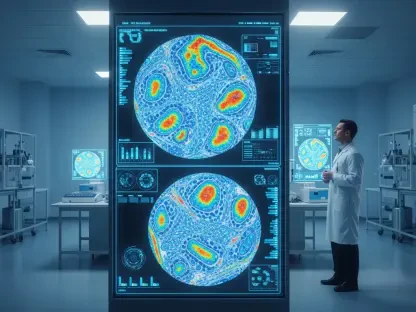Blockchain technology is revolutionizing various industries, and healthcare is no exception. By providing a decentralized and immutable way to manage data, blockchain is enhancing data security, transparency, and operational efficiency in healthcare. This article explores how blockchain is transforming healthcare data management, focusing on its applications, benefits, and the leading platforms driving this change.
Enhancing Data Security and Integrity
Decentralized and Immutable Records
Blockchain’s decentralized nature ensures that no single entity controls the data, significantly reducing the risk of data breaches. Each transaction, once recorded, is added to a block and linked to the previous block, forming an immutable chain that guarantees data integrity. This means that once data is entered into the blockchain, it cannot be altered or deleted, ensuring that patient records remain secure and tamper-proof. In the healthcare sector, this characteristic is crucial as it fosters trust among various stakeholders, including patients, providers, and insurers. Such trust is vital in maintaining the confidentiality and accuracy of medical histories and treatment plans.
Moreover, in an environment where data breaches are increasingly common, the immutable nature of blockchain provides a much-needed layer of security. Healthcare organizations can significantly reduce vulnerabilities by relying on a decentralized system where data manipulation is virtually impossible. With cyber-attacks on the rise, the traditional centralized databases commonly used in healthcare are becoming obsolete. Blockchain’s secure and robust framework ensures that patient information remains protected, promoting data integrity across the board.
Compliance with Privacy Standards
Maintaining patient privacy is a primary concern in healthcare, and blockchain technology is well-suited to meet stringent privacy standards and regulatory requirements, such as the Health Insurance Portability and Accountability Act (HIPAA). By utilizing advanced cryptographic methods, blockchain ensures that only authorized individuals can access sensitive patient data. This encryption significantly mitigates the risk of unauthorized access, maintaining the highest levels of confidentiality and protecting patient privacy. The secure nature of blockchain makes it an ideal solution for handling personal health information that requires protection against unauthorized access and breaches.
In addition, blockchain’s capacity to provide an audit trail that is both transparent and secure aligns with regulatory compliance demands. For example, whenever patient data is accessed, altered, or shared, the blockchain records all actions immutably. This comprehensive audit trail not only ensures accountability but also facilitates regulatory oversight. By offering enhanced data security and stringent compliance capabilities, blockchain technology provides a robust solution to privacy concerns, making it an invaluable tool in the digital transformation of healthcare data management.
Facilitating Seamless Data Sharing
Interoperability Among Healthcare Systems
One of the major challenges in the healthcare industry is the lack of interoperability among various systems, leading to fragmented and inefficient data management. Blockchain technology addresses this challenge by offering a standardized, secure way to share data across different platforms seamlessly. This promotes greater communication and cooperation among healthcare providers, which in turn leads to improved patient care and coordination. By facilitating the exchange of information efficiently, blockchain ensures that healthcare professionals have timely access to accurate patient data, which is crucial for making informed medical decisions.
The ability of blockchain to promote interoperability among disparate systems transforms how healthcare services are delivered. With patient information often scattered across various databases and institutions, blockchain provides a unified, secure, and globally accessible solution. Enhanced data interoperability not only improves the overall efficiency of healthcare services but also ensures continuity of care for patients traveling or moving between different healthcare systems. This seamless data sharing significantly contributes to better health outcomes and streamlines administrative processes.
Patient Control Over Medical Records
Blockchain technology empowers patients by giving them control over their medical records, fostering a patient-centric approach to healthcare. Platforms like Patientory and Medicalchain enable individuals to securely store, manage, and share their health data with providers. This empowerment not only enhances data security but also promotes patient engagement and active participation in their healthcare journeys. When patients have control over their health information, they become more informed and involved in their care, leading to better health outcomes and satisfaction.
Patients being in control of their medical records also ensures that they can make informed decisions about their health. The ability to securely share their data with healthcare providers allows for better coordination and timely interventions. Furthermore, patients can track and verify how their data is being used, ensuring transparency and accountability. This shift towards patient empowerment in data management is a significant step forward in building a more collaborative and effective healthcare ecosystem.
Streamlining Healthcare Processes
Drug Supply Chain Management
The ability of blockchain technology to provide real-time visibility and traceability makes it ideal for managing the pharmaceutical supply chain. Platforms like Chronicled’s MediLedger Network use blockchain to ensure compliance with regulatory requirements and reduce fraud and counterfeiting risks. By leveraging smart contracts, blockchain automates processes such as order fulfillment and inventory management, streamlining operations and ensuring the safety of drug shipments. This automation not only increases efficiency but also significantly reduces the chances of errors and discrepancies in the supply chain.
The enhanced traceability provided by blockchain ensures that every step in the drug supply chain can be tracked and verified. This transparency is critical in preventing counterfeit medications from entering the market, thereby protecting patient safety. Real-time tracking allows stakeholders to identify and address issues promptly, ensuring the timely delivery of safe medications. This ability to monitor and manage the pharmaceutical supply chain more effectively translates to better quality control and compliance with industry standards.
Clinical Trials and Research
Blockchain technology is also transforming clinical trials and research by ensuring data security and transparency. Platforms like Embleema facilitate virtual clinical trials, enabling participants to digitally consent to the collection, storage, and analysis of their health data. This streamlines data management and patient engagement, accelerating the development of new treatments and bridging communication gaps among patients, healthcare providers, and pharmaceutical companies. By creating a secure and transparent environment, blockchain enhances the reliability and efficiency of clinical trials.
The decentralized nature of blockchain ensures that data integrity is maintained throughout the research process. All data entries are immutable and traceable, which is crucial for maintaining the credibility of clinical trials. Additionally, blockchain’s capacity for secure and transparent data sharing fosters collaboration among researchers and institutions. This enhanced collaboration can lead to faster and more efficient discovery of new treatments, benefiting patients and advancing medical science.
Improving Operational Efficiency
Claims Processing and Billing Systems
Blockchain technology offers considerable improvements in operational efficiency, particularly in claims processing and billing systems. Platforms like Change Healthcare integrate blockchain capabilities to enhance data integrity, auditability, and efficiency in healthcare transactions. By automating workflows with smart contracts, blockchain ensures accurate record-keeping and reduces administrative costs. This leads to more efficient healthcare operations, reducing the time and resources spent on processing claims and managing billing systems.
The automation provided by blockchain minimizes human errors and ensures that all transactions are recorded transparently and immutably. This enhanced accuracy and reliability are crucial in the healthcare industry where errors in claims processing and billing can lead to significant financial losses and administrative burdens. By streamlining these processes, blockchain technology not only improves operational efficiency but also enhances the overall patient experience by reducing delays and administrative hassles.
Real-Time Access to Shared Data
Platforms like Avaneer Health harness distributed ledger technology to enable real-time access to shared data while maintaining privacy and security. This real-time access significantly improves operational efficiency in claims processing, eligibility verification, and care coordination. By fostering interoperability among various systems, blockchain reduces administrative costs and enhances patient outcomes. The ability to access and share data in real time ensures that healthcare providers have the most up-to-date information when making decisions, leading to better patient care and streamlined operations.
Real-time access to data also facilitates more efficient coordination among different healthcare providers. This is especially important in complex cases where multiple specialists are involved. By ensuring that all parties have access to the same information, blockchain technology promotes a more collaborative and integrated approach to healthcare, ultimately leading to improved patient outcomes. These efficiency gains not only save time but also reduce the administrative burden on healthcare providers, allowing them to focus more on patient care.
Leading Blockchain Platforms in Healthcare
Medifakt
Medifakt integrates blockchain with the Internet of Things (IoT) and Machine Learning (ML) to secure and share medical information. Its four-module network supports the transfer, storage, interpretation, and AI evaluation of medical data and images. By incentivizing patient data sharing through a token economy, Medifakt addresses healthcare security and interoperability challenges while enhancing data traceability and supporting advanced big data analytics. This integration of IoT and ML with blockchain offers a comprehensive solution to managing medical data securely and efficiently.
By incentivizing data sharing, Medifakt encourages patients and healthcare providers to contribute to a more robust and comprehensive healthcare data ecosystem. This approach not only enhances data traceability and accuracy but also fosters a culture of collaboration and transparency in healthcare. As a result, Medifakt’s platform supports advanced analytics and personalized healthcare solutions, ultimately improving patient outcomes and overall healthcare delivery.
Guardtime
Guardtime’s KSI® Blockchain is crucial for securing health data integrity across various applications. Used extensively in Estonia’s national health infrastructure, Guardtime ensures reliable patient identity validation and secure access to health records. Its technology enables data privacy while allowing secure data sharing among stakeholders. Guardtime’s Real World Data Engine enhances analytics for pharmaceuticals and regulators without compromising sensitive information. This ensures that healthcare data is both secure and accessible, promoting trust among stakeholders.
The extensive use of Guardtime’s technology in national health infrastructure underscores its reliability and effectiveness. By ensuring that patient identities are accurately validated and health records are securely managed, Guardtime contributes significantly to the efficiency and security of healthcare systems. This robust infrastructure also supports better decision-making and personalized care, enhancing the overall quality of healthcare services.
BurstIQ
BurstIQ focuses on secure data management and interoperability within the healthcare industry. Its unique data ownership model allows healthcare organizations to create, share, and monetize health data in compliance with regulations like HIPAA. BurstIQ’s platform supports clinical research, personalized medicine, and patient engagement, empowering patients to control their health information and improving care coordination. This focus on data ownership and compliance ensures that healthcare data is managed securely and transparently.
BurstIQ’s platform also fosters innovation and collaboration in clinical research. By enabling secure data sharing and monetization, researchers can access a wealth of data that can drive new discoveries and treatments. This collaborative environment not only advances medical research but also ensures that patients benefit from the latest innovations in personalized medicine and healthcare delivery.
IBM Blockchain
Blockchain technology is making a significant impact across various sectors, and healthcare is no exception. By offering a decentralized and immutable method for managing data, blockchain is greatly enhancing the security, transparency, and operational efficiency of healthcare systems. This innovative technology ensures that patient data is secure and tamper-proof, which is crucial for maintaining privacy and trust. Blockchain can streamline administrative processes, reduce the risk of fraud, and improve the accuracy of medical records. Moreover, it facilitates better sharing of patient information among healthcare providers, thereby improving the quality of care.
For instance, blockchain can be used to track pharmaceuticals in the supply chain, ensuring that medications are authentic and have not been tampered with. Leading platforms like Ethereum and Hyperledger are at the forefront of this transformation, providing the tools necessary to implement blockchain solutions in healthcare. This article delves into how blockchain is revolutionizing healthcare data management, focusing on its applications, the benefits it offers, and the top platforms driving these advancements.









